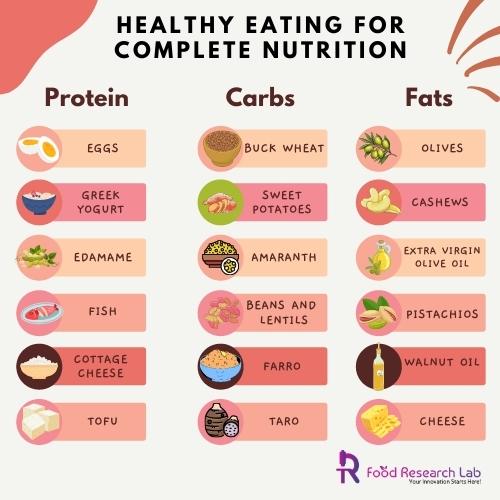More than one-third of your diet should contain starchy carbohydrates. Examples are bread, potatoes, rice, pasta, and cereals are among them. They have more fibre than refined starchy carbohydrates, so they can keep you feeling fuller for longer. Finding a nutrition expert is advisable to help select quality food items. Select brown rice, whole wheat pasta, or potatoes with their skins for more fibre or wholegrain variants.
Appropriate Consumption Practices For Whole Nutrition
A Nutrition Expert is all you Need
More than one-third of your diet should contain starchy carbohydrates. Examples are bread, potatoes, rice, pasta, and cereals are among them. They have more fibre than refined starchy carbohydrates, so they can keep you feeling fuller for longer. Finding a nutrition expert is advisable to help select quality food items. Select brown rice, whole wheat pasta, or potatoes with their skins for more fibre or wholegrain variants.
Fruits and Vegetables
You have to consume five servings of fruits and vegetables daily. They come in various forms, including fresh, frozen, tinned, dried, and juiced.
A glass of approximately 150ml of vegetable or fruit juice is one serving, but restrict yourself to one glass per day since these drinks are high in sugar and can damage your teeth. 80g is a serving of frozen or tinned fruit and vegetables—30 g of dried fruit.
Fish
Fish is good in protein content and offers a range of vitamins and minerals. Try to eat two servings of fish in a week, one of which should be oily. Omega-3 fats present in oily fish may assist in avoiding heart disease. You need fat in your diet, but the amount and type of fat you consume must be carefully monitored.
Fats
Saturated and unsaturated fats are the two principal forms of fat. Too much-saturated fat in your diet can raise your blood cholesterol levels, increasing your risk of heart disease. Men should consume no more than 30 grams of saturated fat per day on average. Women should consume no more than 20 grams of saturated fat per day on average. Food and nutrition consultants suggest small children should intake less saturated fat than adults, but children (below five years old) should not consume a low-fat diet. (1)
Sugar
Consuming high-sugar foods and beverages regularly raises your chances of tooth disease and obesity. Sugary food and drinks are high in energy and can cause weight gain if consumed too frequently. They can also stimulate tooth decay if taken in between meals.
Sugars added to foods or drinks and sugars present naturally in honey, syrups, and unsweetened fruit juices and smoothies are all examples of free sugars. Rather than the sugar found in fruits and milk, this is the type of sugar you should be avoiding. Free sugars are found at unexpected levels in many packaged foods and beverages. Check out our Food and beverage nutrition expert services for further support.
Salt
Consuming high amounts of salt may increase blood pressure and might lead to cardiovascular diseases. Sometimes, you might be consuming unhealthy amounts of salt even if it’s not added to your food. Most products, such as groceries you buy in the market, already contain an excellent salt content. To cut costs, check food labels. If the salt content exceeds 1.5g of salt per 100g, the food product is highly salty. Do a nutrition diet kit planning to help you with your meal plans. (2)
Teens and adults ought to eat less than 6g of salt in a day. Small children should intake even lesser amounts.
Weight Maintenance
To maintain a healthy heart, one has to exercise regularly. It is also responsible for your happiness and well-being. Type 2 diabetes, some malignancies,heart disease, and stroke can all be caused by being overweight or obese. Being underweight might harm your health.
Suppose you want to reduce weight, attempt to eat less and exercise more. Maintaining a healthy weight can be as simple as eating a healthy, balanced meal. Contact a credible nutrition and food safety expert to assist you in weight management.

Beverages
To avoid becoming dehydrated, you should drink enough water. The government recommended that you consume 6 to 8 glasses of water every day. This is in addition to the liquids you down from your food.
All non-alcoholic beverages are acceptable. However, water, low-fat milk, and low-sugar beverages, such as tea and coffee are healthier options. Sugary drinks have high calorific value, so avoid them. They’re also detrimental to your dental health. Free sugar is present in even unsweetened fruit juice and smoothies. Certified food specialists say that your daily total of drinks from fruit juice, vegetable juice, and smoothies should not exceed 150ml, which is around half a glass.
Breakfast
Some people believe skipping breakfast will help them lose weight. Many health and nutrition consultants state that this can be detrimental to one’s health.
A nutritious breakfast substantial in fibre and low in fat, sugar, and salt, on the other hand, can allow you to acquire the nutrients Tests you need for optimum health as part of a balanced meal. A delightful and healthier meal is a whole grain lower-sugar cereal with semi-skimmed milk and fruit slices on top. (3)
Conclusion
The secret to a healthy diet is to eat the appropriate number of calories for your type of work, guaranteeing that the energy you consume is balanced with the energy you expend. Every day, men should consume about 2,500 calories. A woman’s daily calorie intake must be around 2,000 calories.
Food Research Lab Provides Nutrition Expert Service
It is accepted that adequate nutrition is necessary for optimal individual health and well-being. FRL Contract Lab provides a chain of restaurants, hospitals/clinics, and healthcare centres with healthy nutrition diet consultation and diet kit formulation outsourcing services. Our nutritionists and dietitians create meal plan kits and customised nutritionally balanced, calorie-controlled meals that are delicious and suitable for people with various dietary preferences and needs.

Let’s create something Innovative and Delicious together
Food Research Lab strives for excellence in new Food, Beverage and Nutraceutical Product Research and Development by offering cutting edge scientific analysis and expertise.




